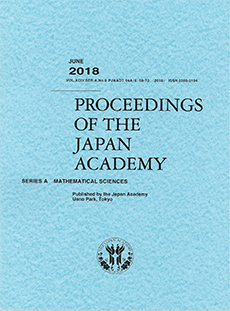Abstract
Let $b$ be an odd prime, $m, r \in \mathbf{N}$ with $2 \mid m$ and $2 \nmid r$, $r > 1$, and define the integers $U_r$, $V_r$ by $(m + \sqrt{-1} )^r = V_r + U_r\sqrt{-1}$. In this paper, we prove that if $a = |V_r|$, $b = |U_r|$, $c = m^2 + 1$, and $b > 8 \cdot 10^6$, $b \equiv 3 \pmod{4}$, then the Diophantine equation $x^2 + b^y = c^z$ has only the positive integer solution $(x, y, z) = (a, 2, r)$.
Citation
Zhenfu Cao. Xiaolei Dong. "The Diophantine equation $x^2 + b^y = c^z$." Proc. Japan Acad. Ser. A Math. Sci. 77 (1) 1 - 4, Jan. 2001. https://doi.org/10.3792/pjaa.77.1
Information





